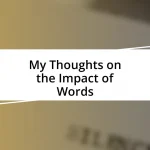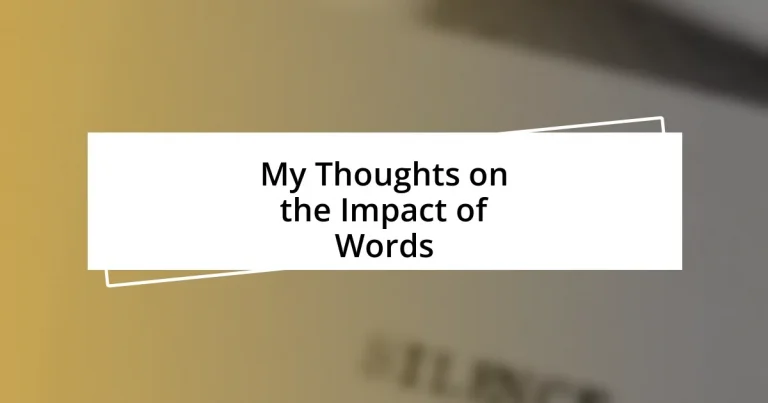Key takeaways:
- Words have the power to uplift or diminish, significantly impacting mood and relationships through thoughtful language.
- Language shapes self-perception and influences behaviors; reframing negative terms can foster resilience and collaborative spirit.
- Intentional communication—validating others, pausing before responses, and asking open-ended questions—enhances connections and understanding.
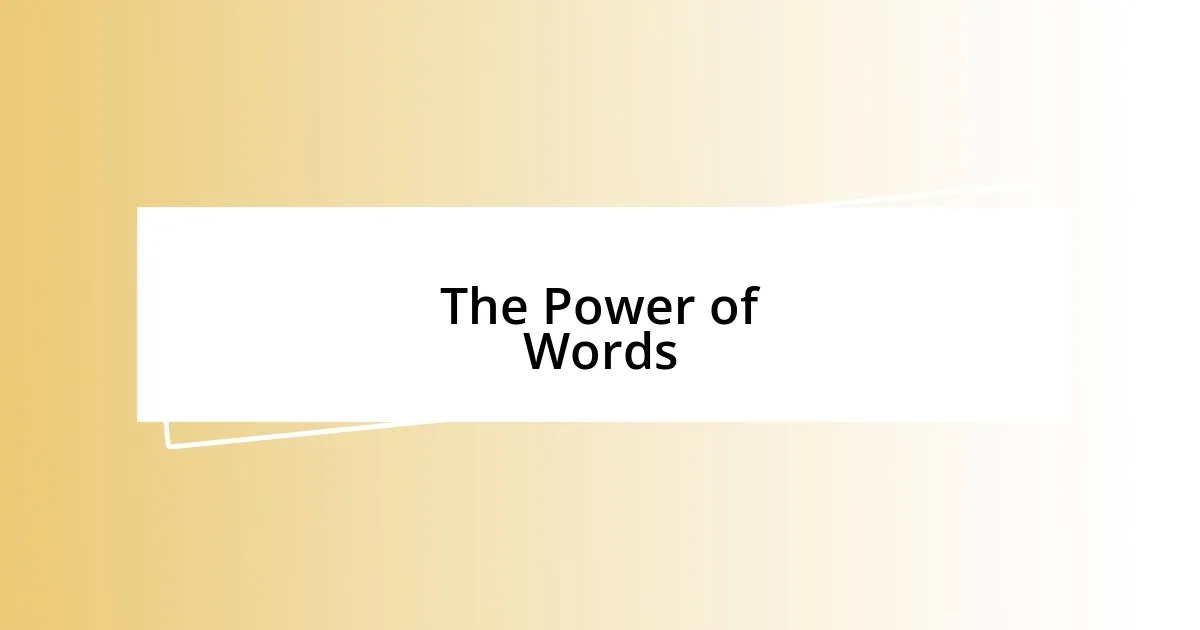
The Power of Words
Words hold an incredible power that often goes underestimated. I remember a time when a simple compliment from a friend completely shifted my outlook for the day, sparking motivation I didn’t know I needed. Have you ever noticed how just a few thoughtfully chosen phrases can brighten someone’s mood or, conversely, darken an entire room?
Consider how words can serve as weapons or tools for healing. I’ve seen relationships fracture and mend solely due to the language we use. For instance, the difference between saying “You hurt me” and “You always mess things up” can either open the door for understanding or slam it shut. How do you think the words you choose influence your interactions?
In moments of crisis, the right words can bring clarity and reassurance. When I faced uncertainty in my career, a mentor shared a simple phrase that resonated with me: “This too shall pass.” Those four words brought comfort during a storm, reminding me that challenges are often temporary. How might your life change if you consciously selected empowering words every day?
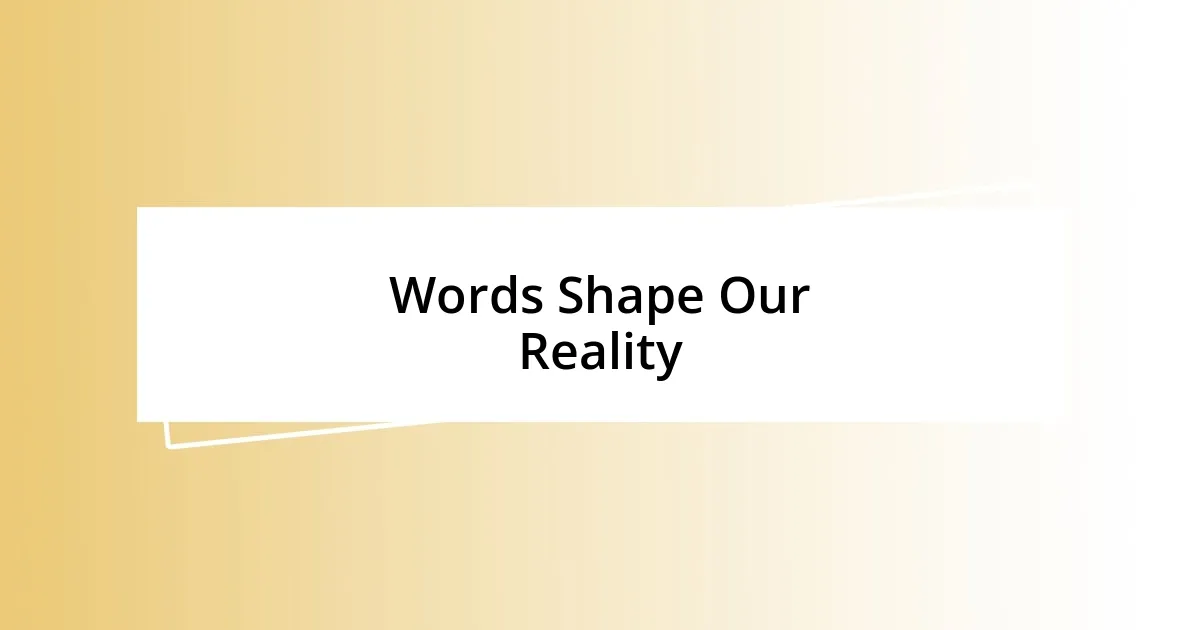
Words Shape Our Reality
Words have a unique way of weaving themselves into our reality, creating the lens through which we perceive the world. One day, after receiving constructive feedback, I realized that the language used—words like “improvement” instead of “failure”—transformed how I viewed my abilities. It was a stark reminder that my self-talk shapes my confidence.
On another occasion, while volunteering, I witnessed firsthand how affirming words breathed life into a child who was struggling academically. When I told him, “You’re capable of amazing things,” I saw his entire demeanor shift; a small seed of belief was planted. The shift in his attitude reminded me just how profound our words can be on shaping a person’s self-image.
Moreover, I’ve often considered how societies construct narratives through language. Think about the terms we use in everyday conversations. Terms like “failure” or “challenge” convey vastly different messages. By reframing our language, we can not only change our perspectives but also influence those around us. How do you think the words you hear daily impact your mindset?
| Positive Words | Negative Words |
|---|---|
| Empower | Discourage |
| Inspire | Deflate |
| Build | Destroy |
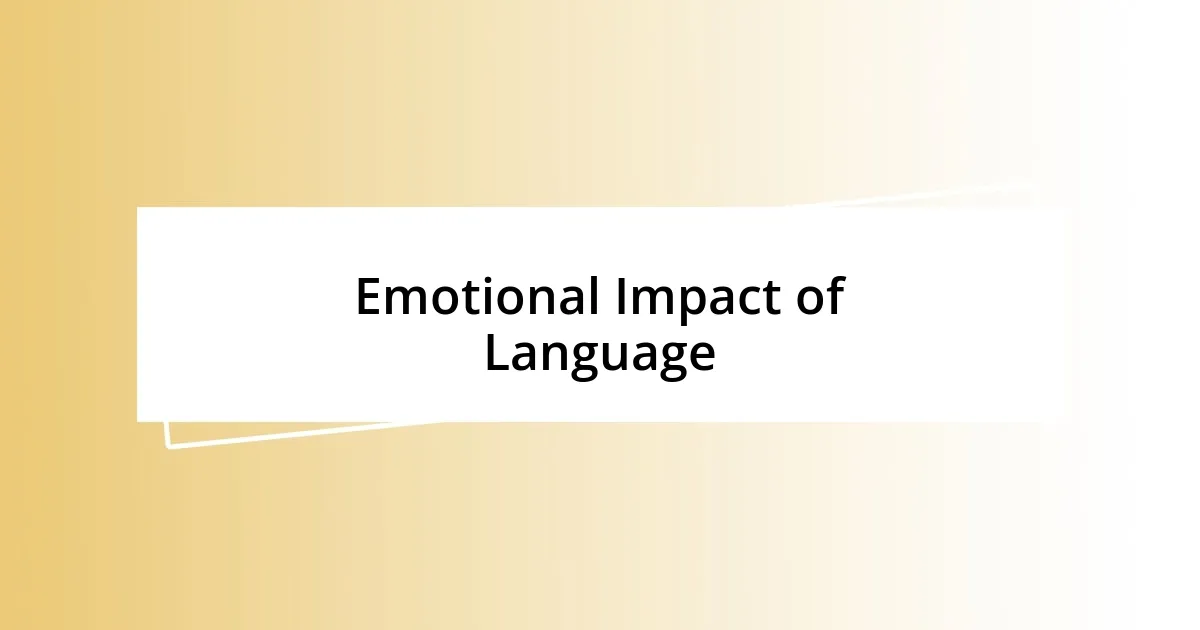
Emotional Impact of Language
Words create emotional currents that can uplift or drown a person’s spirit. I recall a conversation with a colleague who was feeling overwhelmed. When I shared, “You’re handling this better than you think,” I could see a flicker of hope ignite in her eyes. It’s fascinating how language can turn despair into determination with just a few gentle phrases.
The emotional impact of language extends beyond mere words; it resonates on a deeper level. For instance, as a volunteer at a senior center, I found that using familiar terms filled with warmth like “cherished” or “remember” sparked joy among the residents. Their faces lit up, illustrating the connection between language and emotional well-being.
- Words can trigger memories and transport us to happier times.
- Positive language fosters resilience and encourages growth.
- Negative words can linger, influencing self-esteem and mental health in ways we might not even realize.
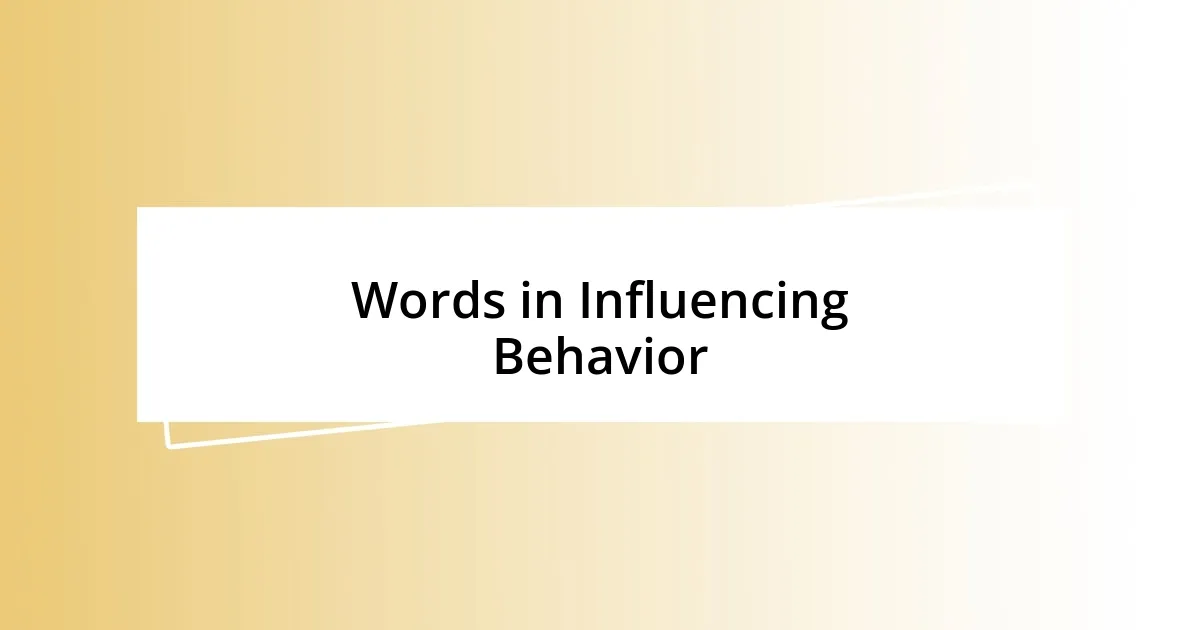
Words in Influencing Behavior
Words wield an impressive power to influence behavior, often guiding our actions in subtle yet significant ways. I remember a time when I was debating whether to take on a leadership role in a community project. A friend simply said, “You have what it takes to inspire others.” Those words didn’t just boost my confidence; they became a motivational anchor that propelled me to step out of my comfort zone and embrace the challenge.
On another occasion, I encountered an interesting dynamic during a workshop I attended. The facilitator emphasized using “we” instead of “I” when discussing group goals. This small shift in language fostered a sense of collective ownership among participants, making everyone feel more invested and engaged. Isn’t it remarkable how the choice of a few simple words can transform an individual mindset into a collaborative spirit?
Reflecting on these experiences, I often consider the ripple effects of the words we choose. I experienced this firsthand during a crucial meeting where a discouraging remark almost derailed the conversation. Thankfully, another colleague stepped in, saying, “Let’s focus on solutions instead.” This redirection wasn’t just about phrases but shifted the group’s energy from defeat to determination. How much could we accomplish if we consciously selected words that uplift and inspire?
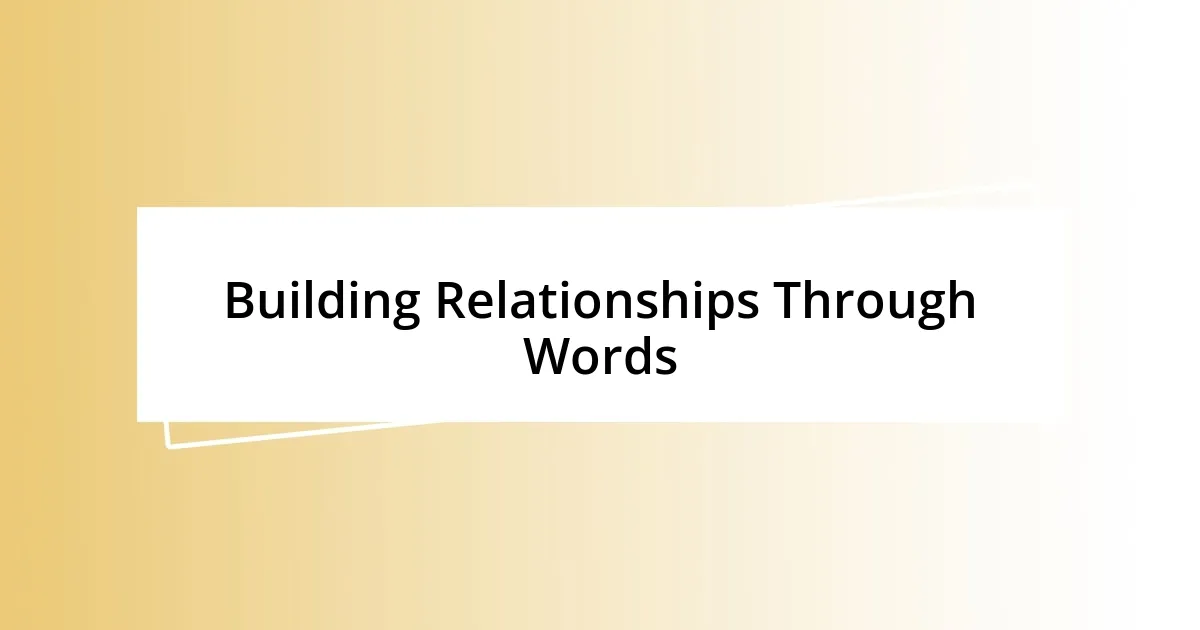
Building Relationships Through Words
Words have a unique ability to forge connections, often in ways we don’t immediately recognize. I once participated in a networking event where I approached a stranger and simply said, “I’d love to hear more about your work.” That single phrase sparked an engaging conversation that blossomed into a meaningful professional relationship. It’s amazing how a few thoughtful words can create a bridge between unfamiliar faces.
In my own life, I’ve found that expressing gratitude can significantly strengthen bonds. One day, I decided to write a handwritten note to a mentor who had guided me through a tough career decision. Simply acknowledging their support transformed our relationship, deepening it in ways an email never could. It made me wonder—how often do we take the time to articulate appreciation in our daily lives?
Listening is just as vital in building relationships, and it’s often overlooked. I remember a chat with a friend where she revealed her struggles with feeling isolated. Instead of jumping in with advice, I chose to respond with, “That sounds really tough; I’m here for you.” Those few words made her feel heard and valued. Isn’t it interesting how sometimes, the best way to build connections is simply to let our words convey understanding?
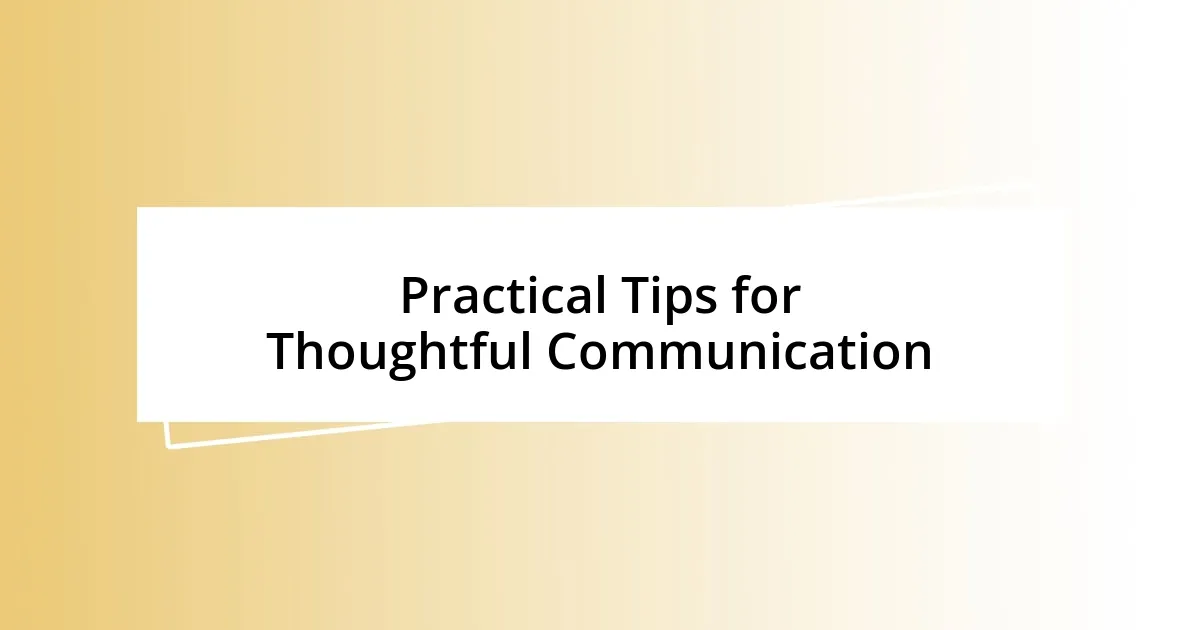
Practical Tips for Thoughtful Communication
When it comes to thoughtful communication, one of my go-to strategies is to be intentional with my words. For instance, in a recent team meeting, I decided to start by validating everyone’s ideas. I said, “I appreciate the creativity you all bring to the table.” This not only set a positive tone but encouraged team members to contribute more freely. Have you noticed how words can create an atmosphere of openness?
I’ve also learned the art of pausing before responding, which has made a significant difference in my interactions. There was a situation where a colleague was defensive about their project. Instead of diving right back with a counterargument, I took a moment and replied, “I see where you’re coming from.” This simple acknowledgment defused the tension and opened up a space for constructive dialogue. Have you ever taken a moment to reflect before responding?
Lastly, I find that asking questions can lead to more meaningful exchanges. For example, during a recent catch-up with an old friend, I asked, “What’s been inspiring you lately?” This question sparked a deep conversation that left us both feeling energized. It’s fascinating how a well-placed question can not only engage but enhance the connection between individuals. Don’t you think great communication starts with genuine curiosity?








